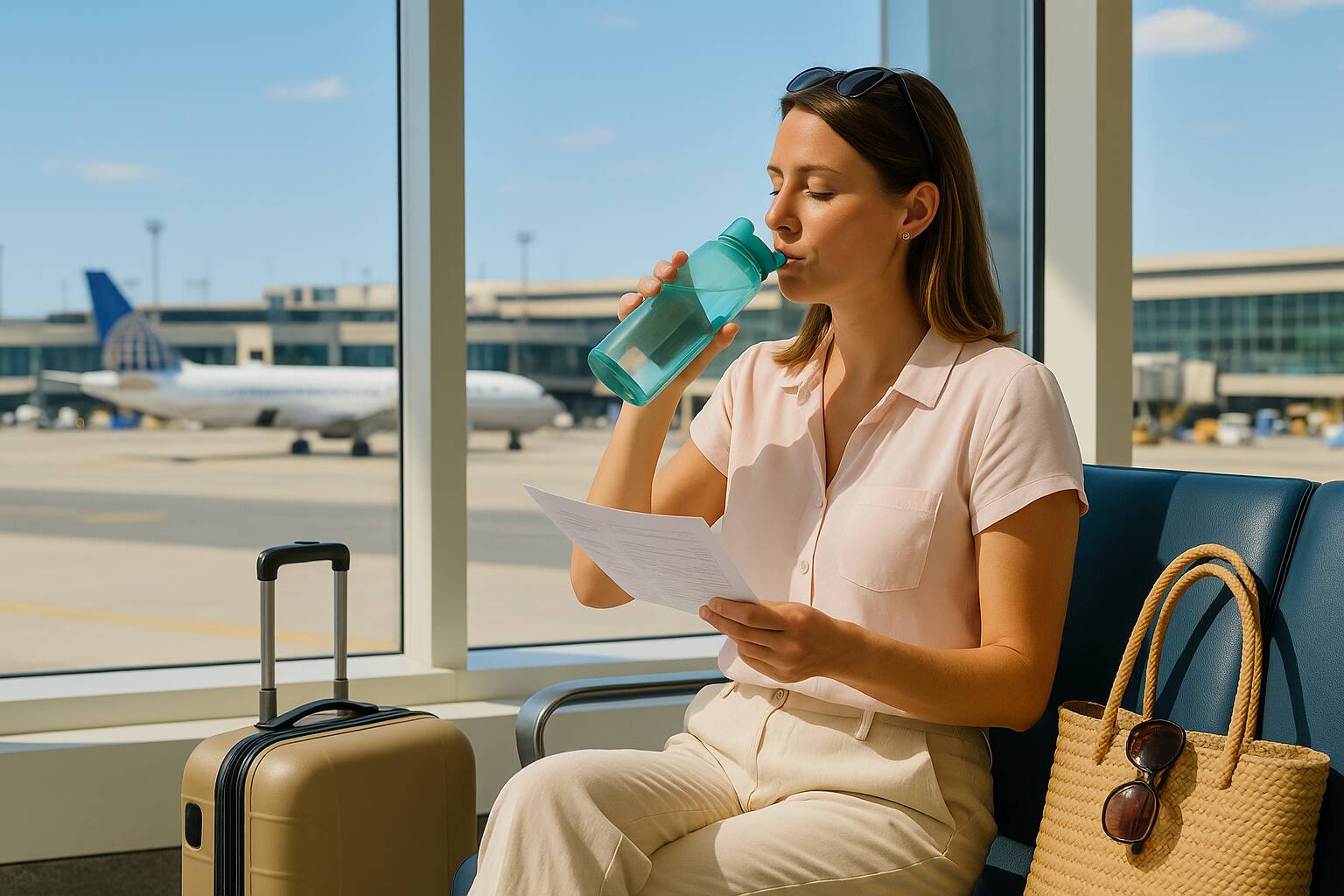How to Stay Healthy While Traveling—Without Missing the Joy of the Experience
 Traveler sipping water at the airport while reviewing a travel checklist
Traveler sipping water at the airport while reviewing a travel checklist
How to Stay Healthy While Traveling—Without Missing the Joy of the Experience
Traveling is one of life’s great joys. You get to explore new places, reconnect with loved ones, become a part of a different culture— even if just for a few days — and try new experiences that open your mind and nourish your spirit. And sometimes, even in the most familiar places, travel allows us to see things with fresh eyes and create new memories that feel just as meaningful.
Whether it's a weekend getaway or a long-awaited vacation, travel helps us reset and recharge. But as an internist, I also know that it can disrupt routines and challenge even the most well-established health habits. Between different time zones, grab-and-go meals, and packed schedules, it’s easy to return home feeling more worn out than when you left.
The good news? With just a little planning, you can enjoy your trip and return home feeling strong, balanced, and energized. Here are some of the practical strategies I share with patients to help them stay well while traveling, all without sacrificing the joy of the experience.
Stick to the Basics: Hydrate, Sleep, Move
When our daily routine changes, our best health intentions often fall by the wayside. Between early flights, long car rides, sightseeing, or simply being out of sync with your regular schedule, it’s easy to overlook the simple things that keep you feeling your best.
Hydrate: Travel, especially flying, can dehydrate you quickly. Aim to drink at least eight glasses of water a day, more if you’re in the sun or enjoying alcohol. I always recommend packing a refillable water bottle in your carry-on so you can stay hydrated, especially on travel days.
Prioritize Sleep: Sleep is the foundation of recovery and immunity. Try to keep your bedtime and wake time as close to your regular schedule as possible, even across time zones. Bring anything that helps you rest. It may be a sleep mask, earplugs, a travel pillow, or a favorite supplement, such as magnesium or melatonin (with your doctor’s approval).
Keep Moving: You don’t need a gym to stay active. Walking through the airport, sightseeing, stretching in your hotel room, or even dancing at a family gathering all count. Even light movement can help improve circulation, reduce bloating, and boost energy levels.
Be Travel-Med Smart
One of the most common things I help patients with before they travel is medication planning. Whether you take one daily prescription or manage a more complex routine, making sure your medications are packed and properly stored can prevent a lot of stress and potential issues while you're away.
Plan Ahead
- Check your medication supply at least a week before you leave, and request refills if needed.
- Pack all medications in your carry-on luggage, never in your checked baggage, to avoid losing them in transit.
- Bring a printed list of your current medications, including dosages and any known allergies. This can be especially helpful in the event of an emergency or if you require care while away.
Mind the Heat
Some medications are sensitive to temperature, especially if you’re traveling to warmer climates. Store them in a cool, dry place—never in a parked car or direct sunlight. For longer trips or when traveling with particularly sensitive medications (such as certain injectables), a small insulated bag with an ice pack can be a smart solution.
What About Airport Security and Flying with Medication?
- You’re allowed to bring all necessary prescription medication in your carry-on, including liquids over 3.4 oz (they need to be screened separately).
- Pill organizers and daily dosing packs are TSA-compliant.
- If your medication needs to stay cold, you can use ice packs, gel packs, or coolers—make sure they’re frozen solid when you go through security.
- It’s helpful—but not required—to keep medications in their original, labeled containers, especially when traveling internationally.
- For added peace of mind, bring a doctor’s note or a copy of your prescription.
📌 Before your trip: Check both TSA regulations and your specific airline’s medication policy, especially if you're carrying injectables, medical devices, or large quantities. Each airline may have slight variations in how they prefer medications and supplies to be packed and declared. If you're traveling internationally, check the U.S. State Department’s travel page for destination-specific medication rules and documentation requirements.
Stay Connected
If you’re part of a concierge or relationship-based practice like mine, don’t hesitate to reach out during your trip if something doesn’t feel right. A quick message or virtual check-in can make all the difference—and potentially help you avoid an urgent care visit in an unfamiliar place.
Eat and Drink Mindfully Without Missing Out!
One of the best parts of travel is enjoying new foods and shared meals. Whether you’re trying local specialties, indulging at a family gathering, or eating on the road, it is possible to enjoy it all without feeling like you’ve gotten off track.
Don’t Aim for Perfection
Vacation eating isn’t about restriction; it is about balance. I often remind my patients (and myself) to use the 80/20 approach: aim for mindful choices 80% of the time, and leave room to fully enjoy those special treats or once-a-year dishes the other 20% of the time. What matters most is what you eat the majority of the time, not what you have as a special indulgence.
Prioritize Protein and Fiber
When you eat out frequently, two key nutrients can help you stay energized and satisfied: protein and fiber. Look for meals that include lean proteins (like eggs, fish, beans, or grilled meats) and vegetables or whole grains. Starting your day with a high-protein breakfast can also help stabilize your energy and reduce cravings throughout the day.
Stay Smart with Alcohol
If you plan to enjoy a drink or two while traveling, go for it! Vacation is a time to relax and enjoy. Please note that alcohol can impact sleep, hydration, and energy levels, particularly in warmer climates or at higher altitudes. I suggest alternating drinks with water and choosing options that are lower in sugar when possible. It’s all about enjoying the moment and feeling your best the next day.
Know When to Take a Health Break
Travel can be exciting, busy, and even a little exhausting, especially if your schedule is packed or you're moving through multiple time zones. But your body will often tell you what it needs. Learning to tune in and slow down, even briefly, can help you enjoy your trip more fully.
Listen to Your Signals
If you’re feeling unusually tired, dizzy, bloated, or just off, don’t ignore it. It might be as simple as needing more rest, hydration, or downtime. And for those managing chronic conditions, like high blood pressure, diabetes, or autoimmune disorders, it’s essential not to push through if your body is asking for care.
Build in Rest Time
Even during the most exciting trips, try to give yourself space to recover—whether that’s a quiet morning, an early night, or just saying no to one extra activity. It’s okay to protect your energy. Travel should feel restorative, not draining.
Trust Yourself
If something feels off—whether it's your energy, mood, or a physical symptom—give yourself permission to slow down or adjust your plans. You know your body best. A little awareness and self-compassion go a long way in helping you stay well on the road. And if you're unsure, don’t hesitate to reach out. That’s what a connected, supportive care relationship is for—even when you’re far from home.
🌍 If you’re heading abroad, the CDC’s Travelers’ Health page is also an excellent resource for up-to-date health alerts, vaccine guidance, and destination-specific tips to stay safe and well during international travel. And, of course, if you have any questions about staying healthy during your trip, don’t hesitate to consult your doctor before you go.
Ready to Travel Well?
Summer travel is meant to be enjoyed—body, mind, and spirit. With a few small habits and a little planning, you can stay grounded in your health while fully embracing the experience.
If you’re preparing for a trip and want to ensure you’re well-prepared to feel your best, I’m here to help. Whether it’s reviewing medications, managing chronic conditions, or simply answering your “what if” questions—I’m just a message away.
Wishing you safe, joyful travels this summer.
✈️ Want more practical advice for healthy travel? Check out the Mayo Clinic’s Travel Checklist for easy, expert-backed tips to stay well before, during, and after your trip.
Resources
TSA Medication Travel Guidelines
Transportation Security Administration (TSA, 2024):
https://www.tsa.gov/travel/special-procedures/medications
International Medication Travel Rules
U.S. Department of State – Travel (2024):
https://travel.state.gov/content/travel/en/international-travel.html
Travel Health Notices and Vaccine Guidance
Centers for Disease Control and Prevention (CDC, 2024):
https://wwwnc.cdc.gov/travel
Healthy Travel Tips and Checklist
Mayo Clinic (2024):
https://www.mayoclinic.org/healthy-lifestyle/adult-health/in-depth/healthy-travel/art-20044170
